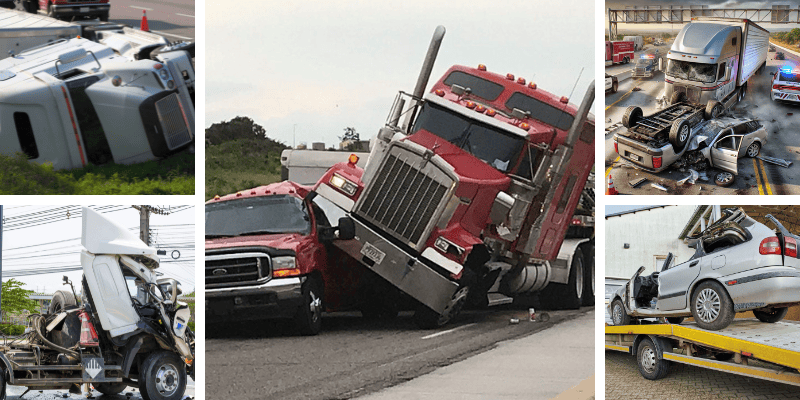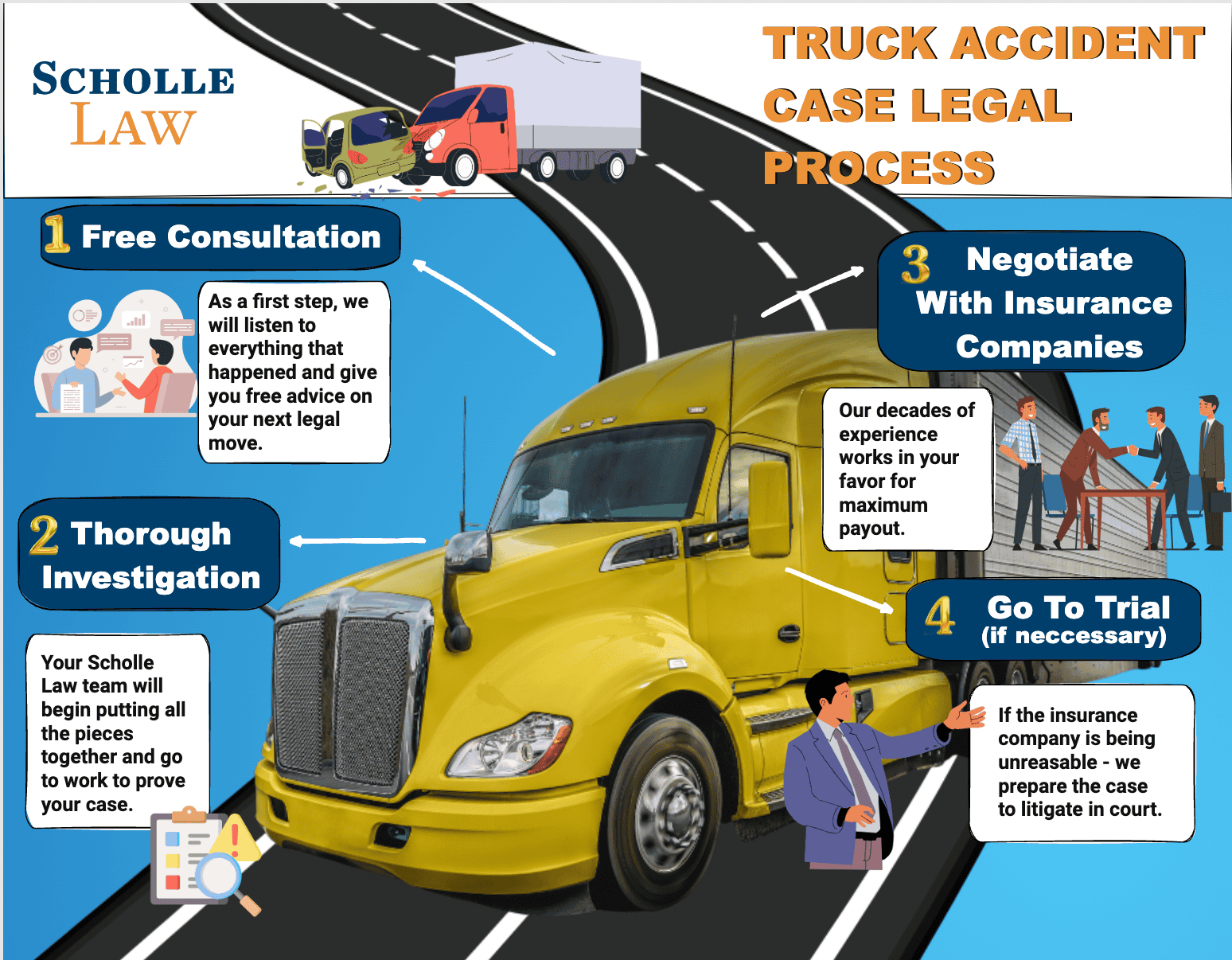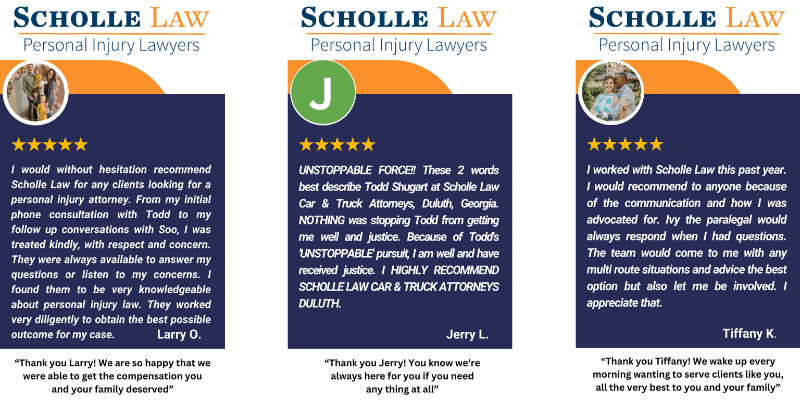4.9 Rating
Google REVIEWS
Leaders in Georgia Personal Injury Law Since 1995

Atlanta Truck Accident Lawyer – Committed to You
At Scholle Law, we understand the profound and lasting impact that truck accidents can have on victims and their families. The immense size and weight of commercial trucks mean that even minor collisions can lead to life-altering injuries and significant financial strain. As an experienced Atlanta truck accident lawyer, Scholle Law is dedicated to guiding you through the complex legal landscape and advocating fiercely for the compensation you deserve. With decades of experience and a strong reputation in Atlanta, we are here to stand by you every step of the way, ensuring that your rights are protected and your voice is heard.
Understanding Truck Accidents in Atlanta
Atlanta is a major transportation and logistics hub, with countless commercial trucks passing through each day. This increased truck traffic often leads to higher accident rates, particularly on major highways like I-285, I-85, I-75 and I-20 for East & Westbound trucks. According to the Federal Motor Carrier Safety Administration (FMCSA) , Georgia frequently ranks among the top states for truck-related fatalities and serious accidents. But why do these accidents happen, and what makes them so dangerous?
- Common Causes of Truck Accidents
Truck accidents can be caused by numerous factors, from human error to mechanical failure. Understanding these causes helps us to identify liable parties and build a strong case for compensation. - Driver Fatigue and Negligence
Truck drivers often face demanding schedules, with tight deadlines that can lead to fatigue. While federal regulations limit the number of hours a truck driver can operate in one stretch, these rules are sometimes disregarded. Driver fatigue slows reaction times, impairs judgment, and is a leading cause of truck accidents. Other forms of negligence, such as distracted driving, speeding, and failure to yield, also contribute significantly to truck-related crashes. - Equipment Failure and Maintenance Issues
The maintenance of commercial trucks is essential for road safety. Brake failures, tire blowouts, and other mechanical issues can lead to catastrophic accidents. When trucking companies or independent contractors neglect regular maintenance, they put everyone on the road at risk. Identifying mechanical failures is a critical part of the investigation process, and Scholle Law has the resources to work with experts in truck accident reconstruction and mechanical engineering. - Overloading and Improper Cargo Loading
Federal laws regulate how much cargo a truck can carry. Overloaded trucks have longer stopping distances, are more prone to rollovers, and are harder to control. Improperly loaded cargo can also shift during transit, affecting the truck’s balance and increasing the risk of accidents. Our team investigates loading practices to determine if improper cargo handling contributed to the accident.

Types of Truck Accidents
Truck accidents come in many forms, each with unique risks and outcomes. Here are some of the most common types:
Blind Spot Accidents
Large trucks have significant blind spots, or “no-zones,” where the driver has limited visibility. Vehicles in these areas are at high risk of being sideswiped or forced off the road if the truck changes lanes. Many blind spot accidents could be avoided if trucking companies provided adequate driver training on blind spot awareness.Jackknife Accidents
A jackknife accident occurs when a truck’s trailer swings out to the side, creating a dangerous 90-degree angle with the cab. These accidents typically happen when a driver brakes suddenly, causing the trailer to slide out of alignment. Jackknife accidents are particularly hazardous because they can involve multiple vehicles, increasing the potential for injuries.Rollover Accidents
Rollover accidents are common in situations where the truck’s load is unbalanced, or the driver takes a turn too quickly. These incidents often lead to multi-vehicle collisions and have a high risk of fatalities. Rollovers are especially dangerous on Atlanta’s highways, where traffic congestion can make it difficult for other drivers to avoid a rolling truck.Underride Collisions
Underride collisions occur when a smaller vehicle slides underneath a truck’s trailer. These accidents are often fatal, as the roof of the smaller vehicle can be crushed. Federal law mandates rear guards on trucks to prevent underride collisions, but not all trucks comply with this standard, leading to deadly outcomes.Why Choose Our Atlanta Truck Accident Lawyers

Choosing the right attorney after a truck accident is crucial. At Scholle Law, we believe that experience, a client-focused approach, and a strong commitment to results set us apart.
Extensive Experience in Truck Accident Cases
With years of experience in handling complex truck accident claims, Scholle Law understands the nuances of truck accident cases. We know the intricacies of trucking regulations, industry standards, and the tactics that insurance companies use to minimize claims. This experience allows us to build compelling cases that hold negligent parties accountable.
Proven Track Record of Successful Settlements
Scholle Law has a strong track record of achieving successful settlements and verdicts for truck accident victims. We have recovered substantial compensation for our clients to cover medical expenses, lost income, pain and suffering, and other losses. Our attorneys are relentless in pursuing the maximum compensation our clients deserve.
Personalized Legal Strategy for Each Client
Every truck accident case is unique, and each client has different needs and priorities. At Scholle Law, we take the time to understand your situation and craft a customized legal strategy that addresses your specific circumstances. Our goal is to alleviate your burdens and guide you confidently through the legal process.

Your Rights After a Truck Accident
Understanding your rights is essential to ensure you receive fair compensation after a truck accident in Georgia.
Understanding Georgia Trucking Laws
Truck accident claims are governed by both federal and state laws. In addition to general road safety laws, commercial trucking companies must comply with FMCSA regulations, including rules on driver hours, vehicle maintenance, and cargo weight limits. Violating these regulations can establish liability in an accident case.Identifying Liable Parties
Truck accident cases often involve multiple liable parties, from the driver to the trucking company, maintenance contractors, and even parts manufacturers. Determining liability is complex, but our attorneys are skilled at conducting thorough investigations to identify all parties that may be responsible.
Steps to Protect Your Legal Rights
In the chaotic aftermath of a truck accident, it can be overwhelming to determine what to do next. However, taking specific actions immediately following the accident is critical to safeguarding your health, protecting your legal rights, and strengthening your potential injury claim. Here’s a step-by-step guide to ensure you take the right actions.
Step 1. Seek Immediate Medical Attention
Your health and well-being should be your top priority following any accident, especially one involving a large commercial truck. Truck accidents often lead to serious injuries such as traumatic brain injuries, spinal cord injuries, fractures, and even internal injuries that might not be immediately visible. Here’s why immediate medical care is essential:
- Hidden Injuries: Many injuries, such as concussions, whiplash, and internal bleeding, don’t show symptoms right away. Even if you feel fine, it’s crucial to see a doctor who can diagnose and document these conditions early on.
- Establishing Evidence of Injury: A delay in seeking medical attention can be used against you by insurance companies, who might argue that your injuries aren’t as serious as claimed or weren’t caused by the accident.
- Comprehensive Examination: Emergency room doctors and other medical professionals can conduct thorough assessments to identify injuries that may require ongoing treatment. Having an official medical record from immediately after the accident helps establish a direct link between the collision and your injuries.
Always keep a record of your medical visits, treatment plans, and prescriptions. These records not only protect your health but also serve as essential documentation in your injury claim.
Step 2. Document the Scene
If you’re physically able, gathering as much evidence as possible from the accident scene is one of the most important steps you can take. Documentation serves as concrete proof of what happened and provides key details that may otherwise be forgotten. Here’s what to focus on:
- Photographs: Use your phone to capture photos of everything relevant, including the damage to all vehicles involved, skid marks, road conditions, traffic signs, weather conditions, and any other details that could provide context to the accident. Be sure to also take pictures of any visible injuries.
- Videos: Sometimes, a video can capture more than a single photo. Take a brief video of the scene, walking around the vehicles and focusing on any visible evidence, including debris on the road.
- Witness Information: If there were witnesses, get their contact details and statements if possible. Independent witnesses can provide impartial accounts of the accident and strengthen your case.
- Notes: Write down your immediate recollection of what happened, as well as any other details you noticed, such as the truck driver’s behavior or things they said post-accident. Details can fade over time, so recording them soon after the incident can help you recall specifics later on.
Step 3. Avoid Speaking to Insurance Adjusters
Insurance companies often contact accident victims quickly after a collision, hoping to settle claims before an attorney gets involved. While it might seem like they’re trying to help, remember that the insurance company’s primary goal is to protect its financial interests. Here are key reasons why you should avoid speaking to insurance adjusters without legal guidance:
- Minimizing Payouts: Insurance adjusters are trained to minimize claim payouts. They may ask leading questions or encourage you to make statements that could be used to downplay your injuries or shift some blame onto you.
- Recorded Statements: An adjuster may request a recorded statement “for their records.” It’s important to politely decline, as these recordings can later be used to contradict your account or dispute your claims.
- Settlement Pressure: Some insurance companies may quickly offer a low settlement to resolve your case. These settlements are often far below the true value of your claim and may not cover long-term medical expenses or lost wages. Once you accept a settlement, you typically waive the right to pursue additional compensation, even if your condition worsens.
- Legal Guidance: Before speaking to any insurance representatives, consult an attorney who can communicate on your behalf, negotiate for fair compensation, and protect your best interests.
Step 4. Consult an Attorney Promptly
In the complex realm of truck accident cases, having an experienced truck accident attorney like Scholle Law by your side is invaluable. Our attorneys can help you navigate the legal landscape, advocate for your rights, and increase your chances of a favorable outcome. Here’s why consulting an attorney promptly is critical:
- Investigation and Evidence Preservation: Evidence can disappear quickly in truck accident cases. Trucking companies often have their own investigators on the scene within hours to protect their interests. An attorney can help ensure vital evidence, such as truck maintenance records, the driver’s logbook, and black box data, is preserved and properly analyzed.
- Understanding Trucking Regulations: Truck accident claims often involve both state and federal regulations. A knowledgeable attorney understands these rules, knows what documentation to request, and can identify any violations that may strengthen your case.
- Determining Liability: Truck accident cases can involve multiple liable parties, including the driver, trucking company, cargo loaders, and manufacturers of truck parts. Identifying all responsible parties can maximize the compensation available to you.
- Negotiating with Insurance Companies: Insurance companies often employ aggressive tactics to reduce or deny claims, especially when dealing with high-stakes truck accident cases. Your attorney can handle negotiations with the insurance adjusters and trucking company representatives, ensuring that you are not pressured into a low settlement.
- Litigation if Necessary: If a fair settlement cannot be reached, Scholle Law attorneys can take your case to court. Having an attorney prepared to go to trial demonstrates to the insurance company that you are serious about obtaining fair compensation, which can encourage a more favorable settlement.
Promptly consulting an attorney provides peace of mind and allows you to focus on your recovery, knowing that your case is being handled by professionals dedicated to achieving the best possible outcome.
Additional Steps to Consider
In addition to these primary actions, there are further steps you can take to protect your rights and strengthen your case after a truck accident:
- Follow Medical Advice: Consistently follow your doctor’s treatment plan, attend all medical appointments, and complete any prescribed therapies. Discontinuing treatment without a doctor’s guidance can be used by insurers to argue that your injuries aren’t as serious as claimed.
- Keep a Pain Journal: Document your pain, emotional distress, and how your injuries affect daily life. This can support claims for pain and suffering damages, as it provides insight into how the accident impacted your quality of life.
- Monitor Social Media Activity: Avoid discussing the accident or posting updates about your recovery on social media. Insurance adjusters may monitor your social media profiles, looking for any statements or photos they could use to dispute your claims.
- Gather Documentation of Economic Losses: Keep records of expenses such as medical bills, prescription costs, travel expenses for medical appointments, and any home modifications needed due to your injuries. Also, track any time missed from work and corresponding wage loss.
Taking these proactive steps not only strengthens your potential claim but also sends a clear message to insurance companies that you are serious about pursuing fair compensation for your losses.
Compensation You May Be Entitled To
Truck accident victims often face substantial financial burdens. The types of compensation available to truck accident victims in Georgia include:
Medical Expenses and Future Care Costs
The cost of treating truck accident injuries can be significant, especially for injuries requiring ongoing treatment or rehabilitation. Compensation may cover emergency care, surgeries, hospital stays, physical therapy, and more.
Lost Wages and Loss of Earning Capacity
Truck accidents can leave victims unable to work temporarily or permanently. Lost wages and loss of future earning capacity are critical components of compensation, particularly if the injuries impact long-term employment potential.
Pain and Suffering Damages
Pain and suffering compensation accounts for the emotional and physical distress caused by the accident. Truck accident injuries often involve substantial pain, lifestyle changes, and emotional trauma.
Property Damage
Truck accidents often result in severe vehicle damage. Compensation may include the repair or replacement cost of your vehicle and other personal property damaged in the accident.
Punitive Damages
In cases where the trucking company or driver’s conduct was particularly egregious, such as driving under the influence or falsifying records, the court may award punitive damages. These damages serve as a punishment for the liable party and a deterrent against future misconduct.
Steps to Take After an
Atlanta Truck Accident
Reporting the Accident
Reporting a truck accident to the Atlanta911 and the correct Ppolice Ddepartment is essential, as this official report is a requirement for most insurance companies to process a claimandan important means of documenting how the truck driveris at-fault. Obtaining an official police report is critical for providing supportive evidence in any subsequent truck accident lawsuit.If the police were not summoned to the accident scene, individuals can file a collision report themselves with the correct police department, but it is much more beneficial to your case for the police to respond to the accident location.
Documenting the Scene
Documenting the accident scene is critical. Here are some steps to follow:
- Take detailed photographs of the scene, including vehicle damage, road conditions, weather, and surrounding property.
- Gather contact information from witnesses and the other party involved.
- Take videos if possible to capture the entire scene.
- Make notes of any important details or observations.
Seeking Medical Attention
Obtaining a prompt medical evaluation and treatment after a truck accident is crucial for supporting your injury claims in a lawsuit. Insurance companies may argue that delays or gaps in medical treatment suggest the injuries sustained are not serious, potentially undermining your claim.In addition, before proceeding with a trial, it’s essential that the victim has a comprehensive understanding of their injuries, which is determined when maximum medical improvement is reached, so that full picture can be presented to a jury.

The Scholle Law Truck Accident Case - Legal Process
The process of pursuing a truck accident claim can seem overwhelming, but Scholle Law is here to guide you through every stage.
Free Initial Consultation
Your journey to recovery begins with a free consultation. During this meeting, we’ll discuss the specifics of your case, answer your questions, and outline potential legal strategies.
Thorough Investigation and Evidence Gathering
Building a strong case requires thorough investigation. We gather all available evidence, including police reports, eyewitness statements, video footage, and data from the truck’s electronic logging device (ELD). We may also work with accident reconstruction experts to analyze the crash. In additional we’ll pursue professional downloads in an effort to preserve of evidence by preventing spoliation.
Negotiation with Insurance Companies
Trucking companies often have powerful insurance policies and teams of adjusters dedicated to minimizing payouts. Our attorneys are experienced in negotiating with insurance companies to ensure you receive fair compensation.
Litigation and Trial Representation if Necessary
While we strive to reach favorable settlements, many commercial vehicle accident cases require litigation. Scholle Law’s trial attorneys are prepared to take your case to court, where we will fight vigorously to protect your rights.
Client Testimonials
At Scholle Law, our clients’ satisfaction and successful outcomes are our highest priorities. Here are a few examples of what past clients have said about working with our Atlanta truck accident lawyers.
Success Stories from Past Clients
Our clients consistently praise our attention to detail, compassion, and results-driven approach. We are honored to have helped many individuals and families find justice and secure the compensation they needed to rebuild their lives.

Our Commitment to Client Satisfaction
From your first consultation to the final resolution of your case, our team is here to provide you with responsive, respectful, and reliable support.
Frequently Asked Questions
What should I do immediately after a truck accident in Atlanta?
First, prioritize safety by calling 911 and seeking medical attention. If possible, gather evidence such as photos, witness information, and vehicle details. Refrain from making statements to the truck company’s insurance and contact Scholle Law for a free consultation.
Who can be held liable in a truck accident case?
Liability in truck accidents can be complex, potentially involving the truck driver, the trucking company, maintenance providers, and even manufacturers. Our legal team will identify all responsible parties to pursue the maximum compensation possible.
How long do I have to file a truck accident claim in Georgia?
In Georgia, the statute of limitations for personal injury claims is generally two years. However, consulting an attorney promptly is crucial to preserve evidence and build a strong case.
What compensation am I eligible for after a truck accident?
Potential compensation includes medical expenses, lost wages, pain and suffering, and more. Every case is unique, and a consultation with Scholle Law will clarify the specific damages you may be entitled to.
How much does it cost to hire a truck accident lawyer?
Scholle Law operates on a contingency fee basis, meaning you pay nothing unless You Win a settlement. This structure ensures that financial concerns never stand in the way of justice.
Can I still file a claim if I was partially at fault?
Georgia’s modified comparative negligence rule allows you to seek compensation if you’re less than 50% at fault, although your award will be reduced by your fault percentage.
Contact Us Today
If you or a loved one has been involved in a truck accident, reach out to Scholle Law. We offer a free consultation to discuss your case, and we are available 24/7 to support you. Our team is committed to securing a positive outcome and helping you rebuild your life after a traumatic accident.
